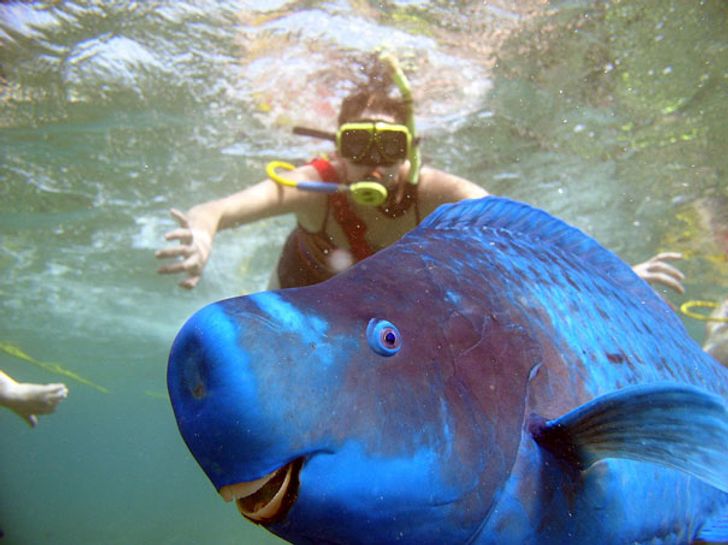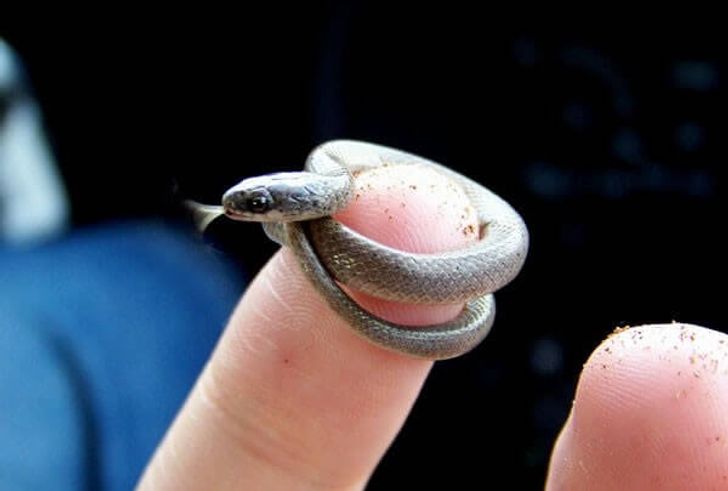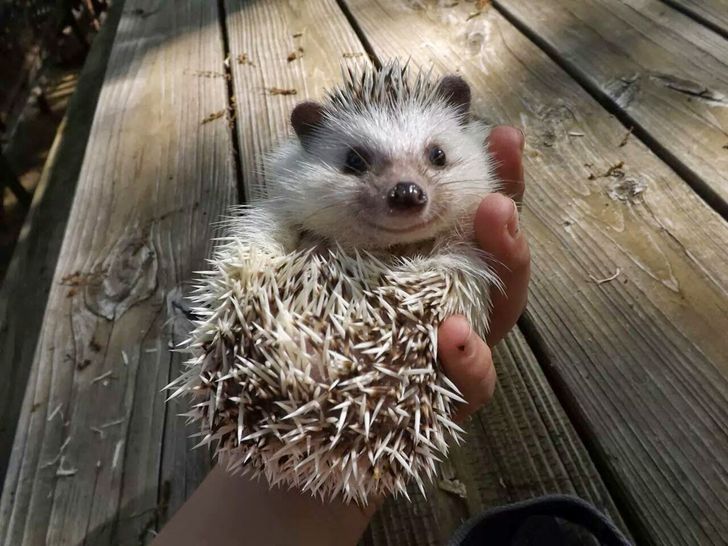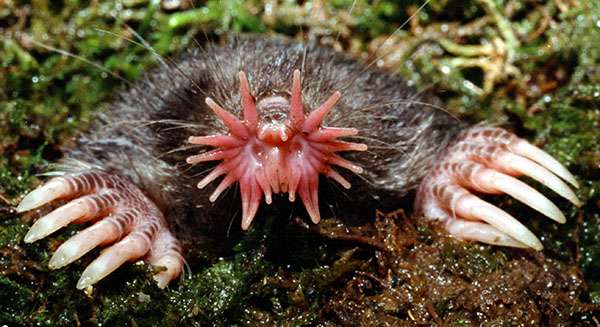
https://www.youtube.com/watch?v=dG_N_0i8a-Q
I think the impala gets it in the end )-:
This little creature is also poetically called the "blue angel," "blue dragon," and "sea swallow." When fully grown, they can be up to 3 cm (1.5") long. Blue glaucuses live in tropical waters and use camouflage to avoid predators.
https://en.wikipedia.org/wiki/Glaucus_atlanticus
Glaucus atlanticus (common names include the blue sea dragon, sea swallow, blue angel, blue glaucus, dragon slug, blue dragon, blue sea slug and blue ocean slug) is a species of small, blue sea slug, a pelagic aeolid nudibranch, a shell-less gastropod mollusk in the family Glaucidae.[2]
These sea slugs are pelagic; they float upside down by using the surface tension of the water to stay up, where they are carried along by the winds and ocean currents. Glaucus atlanticus makes use of countershading: the blue side of their body faces upwards, blending in with the blue of the water. The silver/grey side of the sea slugs faces downwards, blending in with the sunlight reflecting on the ocean's surface when viewed facing upwards underwater.
Glaucus atlanticus feed on other pelagic creatures, including the Portuguese man o' war and other venomous siphonophores. This sea slug stores stinging nematocysts from the siphonophores within its own tissues as defence against predators. Humans handling the slug may receive a very painful and potentially dangerous sting
Also known as "dwarf dragons," they were found quite recently during an expedition in South America's Andes. It is a wood lizard that is active during the daytime and really looks like a tiny dragon. Who wouldn't want that in their home?
https://www.dkfindout.com/us/animals-and-nature/reptiles/dragon-lizards/
Forget a shrimp cocktail with this one! No one will ever willingly try a taste. These gorgeous little marine creatures come in a variety of colors and shapes, and they look amazing in each and every type. The most "flashy" ones are peacock mantis shrimps, like the one in the picture. They are also called Aquaria and are saltwater shrimps that are kept in captivity.
Oldest Living Creature!! Jonathan is 189 years old.
https://www.marketforum.com/forum/topic/68795/

metmike: Jonathan hardly looks a day older than 150 (-:
Pandas are extremely adorable, but this lovely thing, which is also sometimes called the "lesser panda," is a perfect mix of a bear and a cat. They can be affectionate and really funny, which is why they took the internet by storm a few years back. Sadly, these beauties are endangered, and keeping one at home would be quite reckless.
https://en.wikipedia.org/wiki/Red_panda
The red panda (Ailurus fulgens) is a carnivoran native to the eastern Himalayas and southwestern China. It is listed as Endangered on the IUCN Red List because the wild population is estimated at fewer than 10,000 mature individuals and continues to decline due to habitat loss and fragmentation, poaching, and inbreeding depression.[1] Despite its name, it is not closely related to the giant panda.[3]

Who wouldn't want to trade their goldfish for this smiley face? The only problem is that they grow up to be 1.2 m in length and about 20 lb in weight, so you'd need a pretty big fish tank!
Tahr
This is a type of mountain goat, but, unlike all the others, it has gorgeous fur and could easily star in a Pantene ad. Cindy Crawford, watch out!
Maybe you or one of your childhood friends had a little cute bunny as a pet, but it definitely wasn't this little guy. The Ili Pika is an endangered species, and it looks a lot like a short-eared mountain rabbit, but it has nothing to do with rabbits or their genetics. Pikas are really small (up to 250 g in weight) and are colored with red spots on the forehead, neck, and crown.
Sloth

Nobody has a fandom like these adorable creatures! There are YouTube channels exclusively for these guys as well as fan fiction and comics about them. People are generally infatuated with these hairy, wide-eyed, lazy creatures. Just look at them to know why!

Named "the happiest animal in the world," the quokka is a pet you can dare to have if you are not easily scared by strict habitat rules. However, you do need to live in Australia if you hope to meet one

There are a lot of people in the world who are in love with cold-blooded animals. For them, these tiny snakes will be perfect. Though the one in the picture is basically a baby, it's definitely unique and quite adorable in its own way. Oh, you'll also need to feed it mice at some point.
 Inhabiting forests and parks, hedgehogs are really mice with needles and cute faces. Their facial expressions are distinctive, and they are so nice to have around. But remember that they are carnivorous creatures, meaning they eat bugs (not apples, like the hedgehogs in fairy tales).
Inhabiting forests and parks, hedgehogs are really mice with needles and cute faces. Their facial expressions are distinctive, and they are so nice to have around. But remember that they are carnivorous creatures, meaning they eat bugs (not apples, like the hedgehogs in fairy tales).
Tapir
This slightly guilty-looking cross between a piglet and an elephant with distinctive coloring and a small area of habitat is adorably awkward, quite tame, and an unusual animal. On the bright side, its character is pretty cool.

tardigrades are just mind-blowingly impressive. They can survive in some of the most hellish environments you can imagine: temperatures of only a few degrees above absolute zero and withstand pressures higher than the deepest depths of the ocean. They can survive without any water for up to ten years and can live through very high levels of nuclear radiation. They’re really good at surviving.
Sure, you might say, but there are other bacteria that can also do this. Well, bacteria are single-celled creatures, whereas tardigrades are complex, multicellular creatures. They have a tubular mouth armed with stylets used to pierce plant cells, algae or small invertebrates and four pairs of stubby legs. They even have a brain (or rather a cluster of neurons). As far as complex creatures go, tardigrades are the ultimate survivor.
Anglerfish

When your name means you’re a fisherman fish, something’s definitely strange. Most species of anglerfish are deep sea dwellers, which means they live at incredible depths, thriving in the abyssal oceans. They typically have one long filament sprouting from the middle of their heads which they wiggle to resemble a smaller creature and bait in unsuspecting fish.
But as if that weren’t strange enough, scientists were at one point surprised that they didn’t find any male angler fish, and all the females seemed to have a strange parasite. After a while, they realized that the “parasite” was actually a male – attached to a female and surviving only to fertilize the female when she is ready to spawn.
Strange creatures aren’t just tiny or marine – the Aye-aye is one of the strangest things I’ve ever seen. Exclusively found in the north-eastern parts of Madagascar, these peculiarly looking primates have big eyes and slender, long fingers – with a much larger middle finger used for finding insect larvae under tree bark.
Unfortunately, due to their bizarre appearance, ancient legends of Malagasy considered them to be a very bad omen and usually killed them on sight. For this reason, fewer than 1000 specimens still remain in the wild. The species is now protected, however.

No, the neck hasn’t been photoshopped. Also known as Waller’s gazelle, Gerenuks have highly elongated necks which they used for reaching higher plants. They also feature very long legs which they use to sprint away from danger.
Gerenuks do not appear to drink water; they get enough water from the plants they eat. They are also very fast and are often able to escape predators.

Also known as the Treehopper, this is a species related to cicadas. Not much is known about them, but they do use their beaks to pierce through plants and then feed on the sap.
The dorsal horn gradually tapers to a point from base to summit, similar to a thorn in appearance. It lives in many areas of South America. https://en.wikipedia.org/wiki/Treehopper

Crabs are a strange bunch themselves, but the Yeti Crab has to take the crown. Discovered only in 2005, the species is only 15 cm long and is notable for the sheer quantity of silky blond setae (resembling fur) covering its pereiopods (thoracic legs, including claws).
It lives in the very South of the Pacific Ocean, has very small eyes that lack pigment and is thought to be blind – or almost blind. It lives in a very particular environment, on the bottom of the ocean, close to hydrothermal vents. The “hairy” pincers contain filamentous bacteria, which the creature may use to detoxify poisonous minerals from the water emitted by the hydrothermal vents where it lives.

They were once ubiquitous in the European steppes but now, they’ve almost been hunted to extinction. At the beginning of the 18th century, it was still distributed from the shores of the Black Sea, but today, its habitat has greatly shrunk.
The Saiga antelope is a critically endangered species that originally inhabited a vast area of the Eurasian steppe zone from the foothills of the Carpathian Mountains all the way to Mongolia. Even today, the species continues to decline. The horn of the saiga antelope is used in traditional Chinese medicine and can sell for as much as $150 — which is why the species is hunted extensively.

The star-nosed mole is one of the most recognizable creatures in the animal kingdom, having twenty-two pink fleshy appendages ringing its snout, which is used as a touch organ with more than 25,000 minute sensory receptors. With these organs, it is perfectly equipped to detect seismic waves.
https://en.wikipedia.org/wiki/Star-nosed_mole
https://phys.org/news/2017-04-totally-bizarre-facts-star-nosed-mole.html


After the aye-aye, we’re back again in the Madagascar for a creature that’s just as weird. The lowland streaked tenrec is a strange mixture of hedgehog, shrew, mouse and even otter.
If threatened by a predator, it erects the barbed quills on its back and on the crest around its head, pointing them completely forward and then moving towards the attacker. The nonbarbed quills on the back are used to make a rattling sound to communicate with others.

This small creature might not look like much but it is, from what we know, the only immortal animal in the world.
Found in the Mediterranean Sea and in the waters of Japan, it can revert completely to a sexually immature, colonial stage after having reached sexual maturity as a solitary individual; according to studies conducted on it, it can do this indefinitely without any repercussions, becoming effectively immortal.

Earlier this year, scientists reported the discovery of two new spider species which are, for the lack of a better word, extremely cute.
The species are a part of the jumping spider family, belonging to the peacock spider genus. They’re called peacock spiders not only because they are so brightly colored, but also due to their dancelike, courtship rituals. The two new species were found in southeast Queensland by Madeline Girard, a graduate student at the University of California.

The red-lipped batfish or Galapagos batfish has a very strange morphology with bright red lips and fins more adapted for walking than swimming.
Metmike: Looks like lipstick (-: https://en.wikipedia.org/wiki/Red-lipped_batfish

We’re staying in the oceans for the next one. They may look cute, but they’re extremely resilient. The Dumbo octopus lives at extreme depths of 3,000 to 4,000 metres (9,800 to 13,100 ft) with some living up to 7,000 metres (23,000 ft) below sea level.
The largest Dumbo octopus ever recorded was 1.8 metres (5.9 ft) in length and weighed 5.9 kilograms (13 lb) but average specimens rarely go over 30 centimeters.
https://en.wikipedia.org/wiki/Grimpoteuthis
Dumbo Octopus in Action | Nautilus Live
https://www.youtube.com/watch?v=5qw8bAdIS_E

This species of rodent is found in the deserts and grasslands of China and Mongolia.
The very long tail helps its very long legs run even faster, and despite not visible in this picture, their ears are generally extremely large – even larger than their heads. The big ears not only allow them to hear better, but are efficient at dissipating heat, a much-needed attribute in the hot deserts.
Lions Roaring Compilation

The Barreleye is another deep-sea fish, remarkable for the transparency of its head.
All species have large, telescoping eyes, which dominate and protrude from the head, but are enclosed within a large transparent dome of soft tissue. The eyes generally look upwards but can also be directed forward and the transparency of their heads enhance the vision.
When looking at these remarkable creatures, it’s important to note that this is not a freak show – let’s celebrate our planet’s biodiversity instead of fearing it.